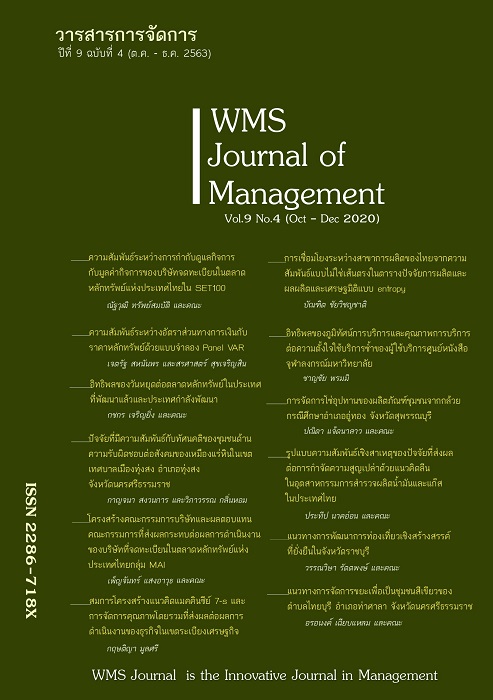Approaches for Sustainable Creative Tourism Development in Ratchaburi Province, Thailand
Main Article Content
Abstract
The objectives of this research were to analyze strengths, weaknesses, opportunities and obstacles and to study guidelines for sustainable creative tourism development in Ratchaburi Province. Qualitative research tools including community study report form, tourist resource audit checklist, in-depth interview and focus group were used. Key informants of this research were representatives of the government, private sectors, residents and tourists in Ratchaburi Province totally 32 people. The results of the research revealed that (1) Ratchaburi Province has strengths regarding the development of sustainable creative tourism such as its easy access location which is suitable as a center for creative tourism destination as well as the cultural inheritance of 8 ethnic groups. Its weaknesses are such as the lack of a strategic plan and the working group for creative tourism development. Its opportunities are such as a green agricultural city policy by a government and its nearby provinces have high tourism potential which can be linked as a creative tourism cluster. And its obstacles are such as rival countries with a high tourism potential as well as the world economy is in a downtrend. (2) Approaches in order to develop sustainable creative tourism in Ratchaburi province are including the proactive approaches such as to brand Ratchaburi province as a Southeast Asian cultural creative tourism destination, the corrective approaches such as to create a strategic plan and establish an integrated work group of all stakeholders for sustainable creative tourism development, the preventive approaches such as to enhance its local agricultural economy in order to earn capital for creative tourism development, and the defensive approaches such as to manage tourism private sectors in natural attractions and vulnerable areas.
Article Details
References
Bantaotuk, P. (2000). ʻāhān phư̄n thin chāttiphan rāt burī [Food of Ratchaburi Ethnic Groups]. Ratchaburi, Thailand: Ngandee Media (2005) Group.
Boonyatistarn, E. (2010). khūmư̄ wikhro̜ SWOT yāng mư̄ʻāchīp [Manual of Advanced SWOT Analysis] (2nd ed.). Nonthaburi, Thailand: Panyachon Publisher.
Chinachot, P. (2016). kānphatthanā tūa bǣp yutthasāt kānčhatkān khunnaphāp phư̄a kānthō̜ngthīeo chœ̄ng sāngsan khō̜ng sūanphưng [The development of a quality management strategy model for creative tourism of Suan Phueng]. (Ph.D. Thesis). Silpakorn University, Thailand.
Cooper, C. (2012). Essentials of Tourism. (ed.). Essex, England: Pearson Education Limited.
Dhamabutra, P. (2015). ʻēkkasān prakō̜p kān rīan kānsō̜n kīeokap kānthō̜ngthīeo chœ̄ng sāngsan [Creative Tourism Textbook]. Bangkok, Thailand: College of Management, University of Phayao, Thailand.
Khittasangkha, M. (2010). kānsưksā kānphatthanā sakkayaphāp kānbō̜rihān čhatkān kānthō̜ngthīeo chœ̄ng watthanatham nai phư̄nthī phāk nư̄a tō̜n bon kō̜ranī sưksā čhangwat chīangrāi Chīang Mai læ mǣhō̜ngsō̜n [The Study of Managerial Potentiality on Cultural Tourism in Upper Northern Thailand: Cases of Chiangrai, Chiangmai and Mae Hong Son Provinces]. Chiangrai, Thailand: Chiangrai Rajabhat University.
Korez-Vide, R. (2013). Enforcing sustainability principles in tourism via creative tourism development. Journal of Tourism Challenges & Trends, 6(2). 35-57.
Kromma, A. (2007). khon rāt burī [Ratchaburi People]. (ed.). Ratchaburi, Thailand: Dhammaraksa Press.
Lincharoen, A. (2012). theknik kān wikhro̜ khō̜mūn chœ̄ng khunnaphāp [Qualitative Data Analysis Techniques]. Journal of Educational Measurement, Mahasarakham University, 17(1), 17–29.
Onpreeda. (2015). kānphatthanā kānthō̜ngthīeo yāng yangyư̄n khō̜ng čhangwat rāt burī læ samut songkhrām [Sustainable Tourism Development of Ratchaburi and Samut Songkhram Province]. (Ph.D. Thesis). Valaya Alongkorn Rajabhat University, Thailand.
Poolpipat, U. (2002). kānthō̜ngthīeo bǣp yangyư̄n : kō̜ranī sưksā kānthō̜ngthīeo chœ̄ng Niwēt dōi chumchon nai prathēt Thai [Sustainable Tourism : A Study of Community-based Ecotourism in Thailand]. TAT Tourism Journal, 21(4), 38-48.
Richards, G. & Marques, L. (2012). Exploring Creative Tourism: Editors Introduction. Journal of Tourism Consumption and Practice, 4(2), 1-11.
Strategy and information for provincial development Subdivision, Ratchaburi Provincial Office. (2020). phǣn phatthanā čhangwat rāt burī hā pī ( Phō̜.Sō̜. 2561 - 2565) [5-year Ratchaburi Province Development Plan (2018-2022)]. Retrieved from http://www.ratchaburi.go.th/plan-2551/p_61-65/approve_2564/approve_2564.pdf.
Tantivejkul, S. (2006). kānprayukchai pratyā sētthakit phō̜phīang [Application of Sufficiency Economy Philosophy]. Bangkok, Thailand: Department of Community Development.
Tapscott, D. (1994). Digital Economy. NY: McGraw-Hill.
Tourism Authority of Thailand. (2515). pœ̄t tūa sipsō̜ng mư̄ang tō̜ng hām ... phlāt. [The Announcement of 12 Hidden Gems]. TAT Review, 1(1), 20-22.
Wisudthiluck, S., Saipan, P., Teparakul, O. & Sindecharuk, T. (2013). kānthō̜ngthīeo chœ̄ng sāngsan [Creative Tourism]. Bangkok, Thailand: The Designated Areas for Sustainable Tourism Administration.


